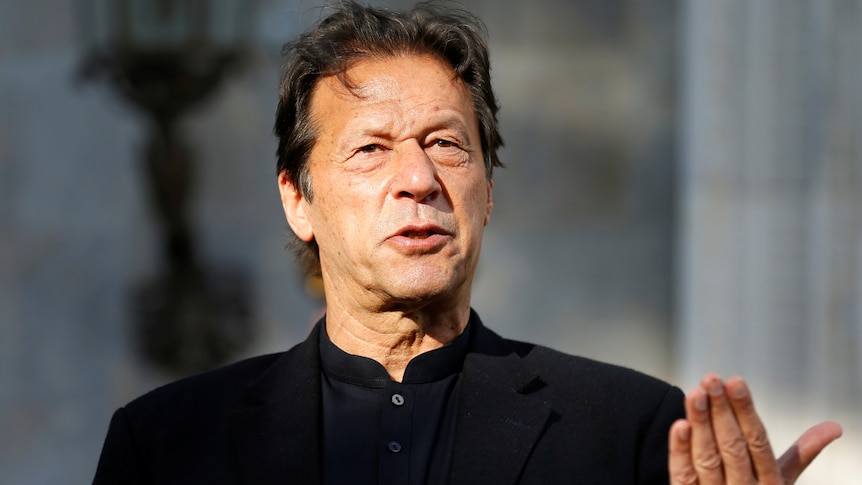I t is the invisible “bat” of the jailed former cricketer-turned-politician and former Prime Minister of Pakistan Imran Khan that is seemingly silencing the gun of the country’s military establishment. That is the upshot of the results of the general elections in the country. The followers of Khan fought the elections as independent candidates sans their party’s electoral symbol – bat -, as neither their party nor their leader was allowed to contest. But, candidates backed by Imran’s Pakistan Tehreek-e-Insaf (PTI) have upset all calculations of their opponents and the military establishment by winning more seats than any of their principal adversaries – Pakistan Muslim League-Nawaz (PML-N) and Pakistan People’s Party (PPP). In fact, these politicians allied with Khan’s party have defied a military-led crackdown and alleged widespread rigging to register victory in most seats, even though Nawaz Sharif claimed he would form a coalition government. Independent candidates supported by PTI stunned everyone with their electoral success belying all expectations that Sharif, a three-time former Prime Minister, and his PML-N would have a cakewalk, winning an easy majority. The outcome was so unexpected that Khan did not waste time and declared victory from jail in an audio-visual message created using artificial intelligence and shared on his X account. He called on his supporters to celebrate a win that was achieved despite what he called a crackdown on his party. Khan had been arrested in August and last week he received three separate jail sentences that could keep him behind bars for over a decade. But, his popularity has soared in recent months. This is attributed to the rising frustration of voters at the military’s brazen interference in politics. The surge in support for Khan on election day was evident at many polling stations across the country. From first-time voters to elderly women born before Pakistan was established and from labourers to tech workers and lawyers, the overwhelming majority told the media covering the polls that they were ready to back Khan and vote for his party, PTI. Now it is evident they were telling the truth.
However, while initial results showed PTI was ahead of its rivals, allegations of inconsistencies and rigging began to emerge. Thereafter, declarations of results began to slow down and then stopped altogether. Polling agents began to say they were unable to collect results and then there was a reported “technical error” in counting. TV stations were said to have received instructions to stop reporting the results
Sharif was seen to have the backing of Pakistan’s military, which has long been the country’s political power broker. The irony of what is regarded as the failed state of Pakistan is that it is the army which once backed Khan to oust Sharif and is now doing exactly the opposite. It has become virtually the arbiter of whatever democratic process is followed in Pakistan. It seems it was overconfident of its power to determine the course of the country’s politics this time around. It has evidently failed to judge the mood of the people who have rallied behind Khan and his men which is nothing short of a revolt against the military rulers. It could be that this election has convinced the army that the grip it had in the past is dwindling. This could be the reason that the Pak army has appealed to all political parties to ‘show maturity and unity’. These words demonstrate willingness to negotiate and soften the blow but the army is definitely not out. The final tally shows, for the 265 seats in the national assembly, that the PTI-backed independent candidates have won 93 seats, PML-N 75 and the PPP 53. The Muttahida Quami Movement-Pakistan (MQM-P) has bagged 17 seats. Without a simple majority, none of the three principal parties are in a position to form a government. Due to an election commission ruling, PTI candidates had not been allowed to campaign under their party name or symbol and so had to be registered as independents. The rules do not allow independents to form the government on their own and they need to join a party. Hence, a key PTI leader has announced a party would soon be launched and the victorious independents would join it so as to cross the hurdle for forming the government should they manage to chalk up the numbers.
At the same time, Sharif ’s comments after the results were announced indicate he is ready to clinch a deal with the PPP and other smaller parties, including the MQM-P, to form a coalition government. However, such a prospect does not inspire much confidence about a stable government. The same parties came together in a coalition in 2020 and ousted Khan as Prime Minister two years later. They were in government for 16 months, but ended up being largely unpopular due to the country’s continuing economic crisis
Pakistan politics after the elections is interestingly poised. The results seem to be a referendum against decades-long army interference in the country’s politics. The remark of Pakistan army chief Asim Munir that the country needs “stable hands” to move on from the politics of “anarchy and polarisation” indicates the army is cooking up new things and that it would not so easily yield to popular will. Horse trading is also a likely prospect so as to woo PTI backed independents to help the PML(N) form the government.
Be that as it may, the election results prove that the people of Pakistan are ready to take a stand against the army’s interference in the democratic process. Independents forming the largest group of winners in the election results is by no means a small feat.
